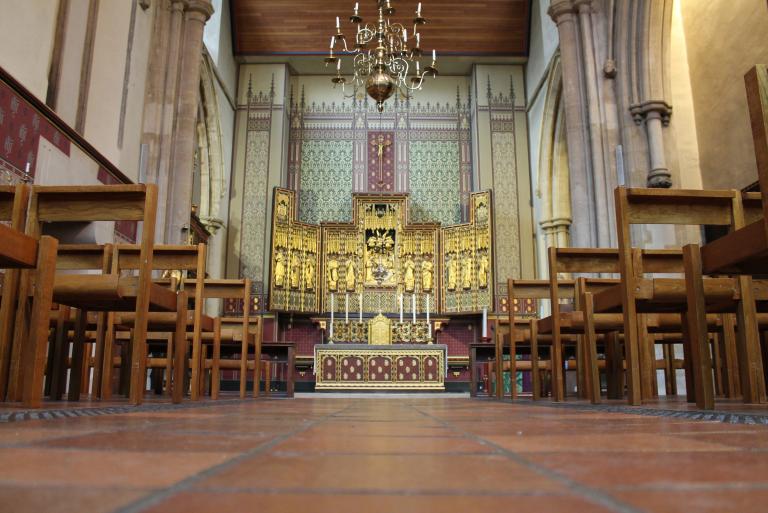


From 4th July, places of worship are permitted to reopen but their communal nature can make them places that are particularly vulnerable to the spread of COVID-19.
Religious leaders are therefore advised to ensure the place of worship is COVID-19 secure in order to minimise the risk of exposure to infection.
It is advisable to restrict numbers of gathering to 30 within a place of worship for public health reasons. It is recommended that, places of worship continue to stream worship to avoid large gatherings and reach those who are self-isolating or particularly vulnerable to COVID-19.
Whilst engaging in an activity in the place of worship, all parties should adhere to social distancing guidelines.
Singing and musical instruments
People should avoid singing, shouting, raising voices and/or playing music at a volume that makes normal conversation difficult or that may encourage shouting. This is because of the potential for increased risk of transmission from aerosol and droplets.
Therefore, spoken responses during worship should also not be in a raised voice.
Activities such as singing, chanting, shouting and/or playing of instruments that are blown into should be specifically avoided in worship or devotions and in rehearsals. This is because there is a possible additional risk of infection in environments where individuals are singing or chanting as a group, and this applies even if social distancing is being observed or face coverings are used.
Where essential to an act of worship, one individual only should be permitted to sing or chant, and the use of plexi-glass screens should be considered to protect worshippers from them, as this will further prevent transmission and the screen can be easily cleaned.
Where music plays a big part in worship, and recordings are available, we suggest you consider using these as an alternative to live singing.
You are advised only to play musical instruments that are not blown into. Organs can be played for faith practices, as well as general maintenance, but should be cleaned thoroughly before and after use.
Face coverings
Evidence suggests that wearing a face covering does not protect you. However, if you are infected but have not yet developed symptoms, it may provide some protection for others you come into close contact with.
Face coverings are not a replacement for the other ways of managing risk, including social distancing, minimising time spent in contact, and increasing hand and surface washing. These other measures remain the best ways of managing risk in a place of worship. If you have symptoms of COVID-19, you and your household should isolate at home: wearing a face covering does not change this.
Worshippers, volunteers and staff, may choose to wear face coverings to offer protection to others and if so it is important to use them properly:
Thoroughly wash hands before putting them on and taking them off.
The key thing is they should cover the mouth and nose and fit well around the face.
Face coverings should not be used by young children or those who may find it difficult to manage them correctly. For example, primary age children unassisted, or those with respiratory conditions.
Aged 70 years and over
Certain groups of people may be at increased risk of severe disease from COVID-19, including people who are aged 70 or older, regardless of medical conditions.
Individuals who fall within this group are advised to stay at home as much as possible and, if they do go out, to take particular care to minimise contact with others outside of their household.
Places of worship, businesses and organisations are being told to collect contact details such as name and number of their visitors as their venues reopen this weekend, to help the NHS Test and Trace service in the national effort to contain and prevent the spread of coronavirus.
The records will help NHS Test and Trace to reach anyone who may at a later date be found to have potentially been in contact with a positive coronavirus case whilst at a particular venue, helping to quickly contact people at risk of the virus and prevent localised outbreaks before they occur.
New guidelines published by the Department of Health and Social Care today sets the simple steps pubs, restaurants, cinemas and similar venues can all take to support the nation NHS Test and Trace Service to contain outbreaks before they occur, preventing the return of lockdown measures and helping to protect the public and save lives.
The steps include:
- Collecting the names, and phone numbers of all staff working at the premises, as well as the date and time they worked
- Making a record of the name and contact phone number of any customers or visitors, or if it is a group of people, the name of the lead member of the group, who is able to contact other members of the group, and the number of people in the group
- Recording the date, arrival and departure time of all visitors or visiting groups
- Storing the information for 21 days, after which should be safely deleted
It is up to each business to determine how to collect this information. The guidance encourages the use of digital systems for ease where possible, however organisations are free to use any logging system that works best for them. This information will only be used where necessary to help stop the spread of COVID-19.
Executive Chair of NHS Test and Trace, Baroness Dido Harding said: As we get ready to enjoy the additional freedoms that are coming this weekend, its vital that we keep up the amazing work that everyone has done across the country to protect their friends, family and communities from the spread of the virus.
Thanks to the information members of the public are already sharing, NHS Test and Trace has already helped contact over 130,000 people who may otherwise have transmitted coronavirus.
The virus has not gone, but we can live more safely alongside it. As we all start to visit more places and come into contact with a wider group of people in the coming weeks, we now need businesses and the public to play their part in this new national effort by sharing their contact details. That way, if someone does test positive our dedicated team at NHS Test and Trace can quickly spring-into-action to contact those who may be at risk and advise them to self-isolate, helping everyone stay safe.
The details visitors share must be stored securely and handled in line with GDPR regulations. They will only be shared, if asked, with the NHS Test and Trace service to manage local coronavirus outbreaks if they occur.
While many parts of lockdown are easing this weekend, the national Covid-19 Alert Level remains at 3 which means the virus is still in circulation in the UK and is a threat to our communities.
By maintaining records of staff, customers and visitors, and sharing these with NHS Test and Trace where requested, organisations can help to identify people who may have been exposed to the virus. Containing outbreaks early is crucial to reduce the spread of COVID-19, protect the NHS and social care sector, and save lives. This will help to avoid the reintroduction of lockdown measures and support the country to return to, and maintain, a more normal way of life.
Currently, if someone tests positive for the virus NHS Test and Trace will ask them to share their recent close contacts. If it is necessary, NHS Test and Trace will contact venues or organisations they have visited in order to identify other people they might have come into contact with.
Many businesses already collect customer data, including restaurants, hotels, hair salons and cinemas, so for some venues they will be able to use their existing records for this purpose, as long as customers are made aware that their data may be shared with NHS Test and Trace.
While the government continues to encourage everyone to play their part to curb the virus, if a member of the public does not wish to share their contact details, it is not mandatory. For instance, if someone provides information when contacting the business, for example when booking a haircut, they can inform the organisation they do not what their details shared with NHS Test and Trace.
Data must be collected and stored in line with GDPR legislation, organisations can visit GOV.UK to find out more information on storing customer data safely, and will only be used by NHS Test and Trace if deemed necessary to helping prevent the spread of COVID-19. Venues will be responsible for keeping a record of the name and telephone number of visitors for 21 days, and the times at which they entered and left the venue, or an estimate if an exact time is not feasible.

Kindly follow us on twitter:@AfricanVoice2









